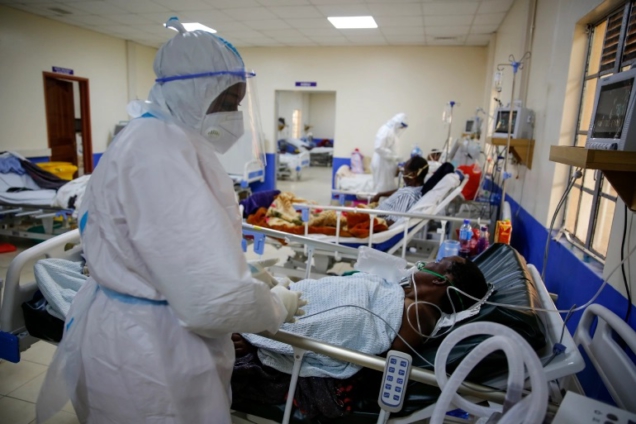Kenyans living with HIV say their lives are in danger because of a shortage of anti-retroviral drugs donated by the United States during a dispute between the US aid agency and the Kenyan government.
The delayed release of the drugs shipped to Kenya late last year occurred after the government slapped an $847,902 tax on the donation. The American aid agency has “trust” issues with the corruption-tainted Kenya Medical Supplies Authority, activists and officials said.
Activists on Friday dismissed as “public relations” the government’s statement on Thursday that it had resolved the issue and distributed the drugs to 31 of Kenya’s 47 counties. The government said all counties within five days will have the drugs needed for 1.4 million people.
“We are assuring the nation that no patient is going to miss drugs. We have adequate stocks,” Kenya Medical Supplies Authority customer service manager Geoffrey Mwagwi said as he flagged off a consignment. He said those drugs would cover two months.
The US is by far the largest donor for Kenya’s HIV response.
Kenya’s health minister, Mutahi Kagwe, told the Senate’s health committee earlier this week that USAID released the drug consignment that had been stuck in port. Patients are expected to receive them during the week.
He said USAID proposed using a company called Chemonics International to procure and supply the drugs to Kenyans because of “trust issues” with the national medical supplies body.
Bernard Baridi, chief executive officer of Blast, a network of young people living with the disease, said the drugs would last for just a month.
He said the delay in distributing the drugs, in addition to supply constraints caused by the coronavirus pandemic, meant many people living with HIV were getting a week’s supply instead of three months.
Many of those who depend on drugs travel long distances to obtain them and may find it difficult to find transport every week, and if they fail to take them they will develop resistance, Baridi said.
Some cannot even access medical facilities to receive medication because of lockdown measures in place to combat the spread of the coronavirus, he added.
“Adherence to medication is going to be low because of access … If we don’t get the medication, we are going to lose people,” said Baridi.
Bernard Baridi, National HIV Youth Prevention Ambassador: Young people are getting medication for 2 weeks some even for a week because of shortage & they are now taking medication today & skipping tomorrow so that the drugs last them longer #DayBreak pic.twitter.com/O2pRTbNf3a
— Citizen TV Kenya (@citizentvkenya) March 31, 2021
According to Baridi, children living with HIV are suffering the most because of the shortage of a drug known Kaletra, which comes in a syrup form that can be taken more easily. Parents are forced to look for the drug in tablet form, crush it and mix it with water, and it is still bitter for children to ingest.
Baridi urged Kenya’s government and USAID to find a solution to who should distribute the drugs quickly for the sake of the children.
On Thursday, about 200 people living with HIV in Kisumu, Kenya’s third-largest city, held a peaceful protest wearing T-shirts reading “My ARV’s My Life” and carrying posters that read “A sick nation is a dead nation” and “A killer government”.
Some 136,000 people live with HIV in Kisumu, or about 13 percent of the city’s population, said local rights activist Boniface Ogutu Akach.
“We cannot keep quiet and watch this population languish just because they can’t get a medicine that is lying somewhere, and that is happening because the government wants to tax a donation,” he said.
Erick Okioma, who has HIV, said the government’s attention has been diverted by the Covid-19 pandemic.
“People fear even getting COVID than HIV,” Okioma said, asserting that local HIV testing and treatment centres were empty.
Latest Stories
-
Could gum disease affect your performance? Experts weigh in
2 hours -
Savannah Regional Minister commends Saha Global for water expansion initiative
2 hours -
Ningo-Prampram MP secures emergency water relief, GWCL MD to visit for long-term solution
2 hours -
Aspiring media professionals admonished to pursue impactful practice, not quick riches
2 hours -
E.P College of Education holds 18th matriculation ceremony
3 hours -
Vigil night to be held for late Mawuli Semevo at National Theatre
3 hours -
LEAP: Gov’t to pay over GH₵200m to 350k households
3 hours -
Leave government if you want to be a miner – Mahama cautions appointees
3 hours -
Kejetia Market management asked to step aside for investigations on allegation of mismanagement
3 hours -
I didn’t ask you to join my Kennedy Agyapong lawsuit – Anas to Obinim
3 hours -
World Cup 2026Q: Chad players who could threaten Ghana’s redemption mission
4 hours -
Adum fire outbreak has been curtailed – Chief Fire Officer
4 hours -
High Court dismisses FGR/Blue Gold suit against Heath Goldfield’s lease to Bogoso Prestea Mines
4 hours -
Bibiani Magistrate Court remands 42-year-old farmer for attempting to kill ex-wife
4 hours -
Muntaka vows to look into excesses in ongoing ‘raids’ on former officials
4 hours

